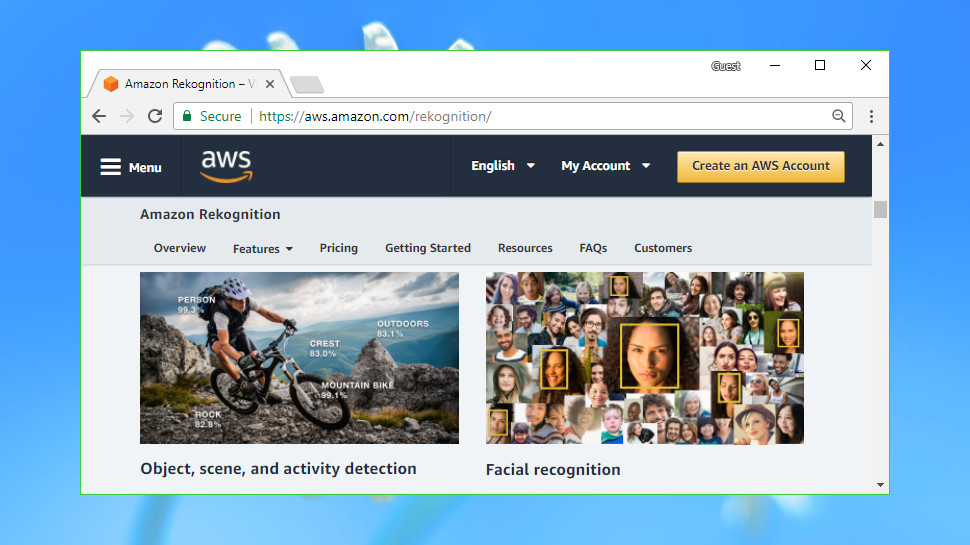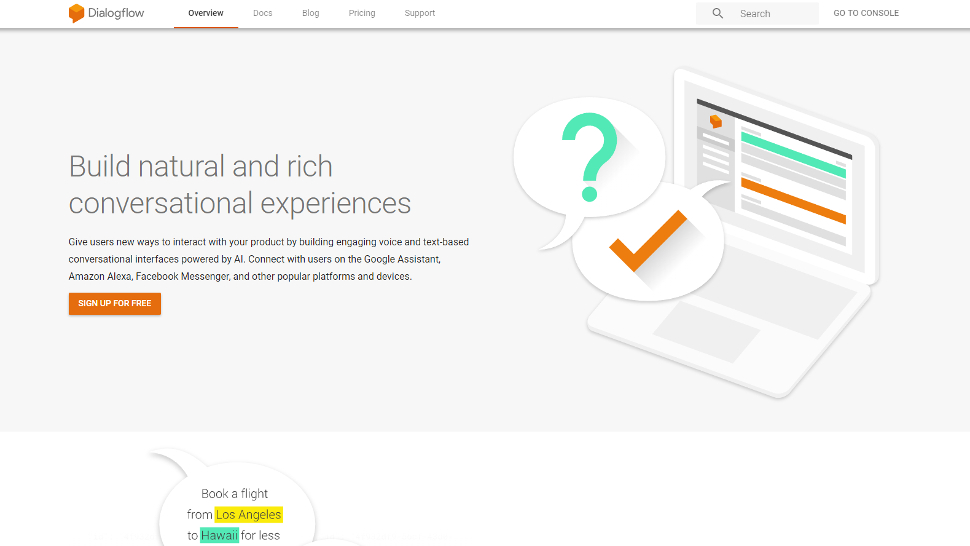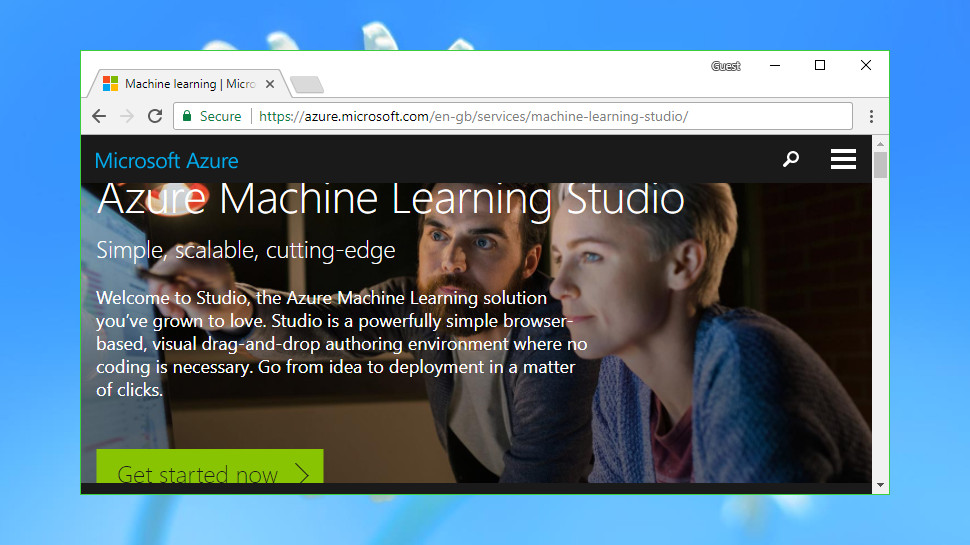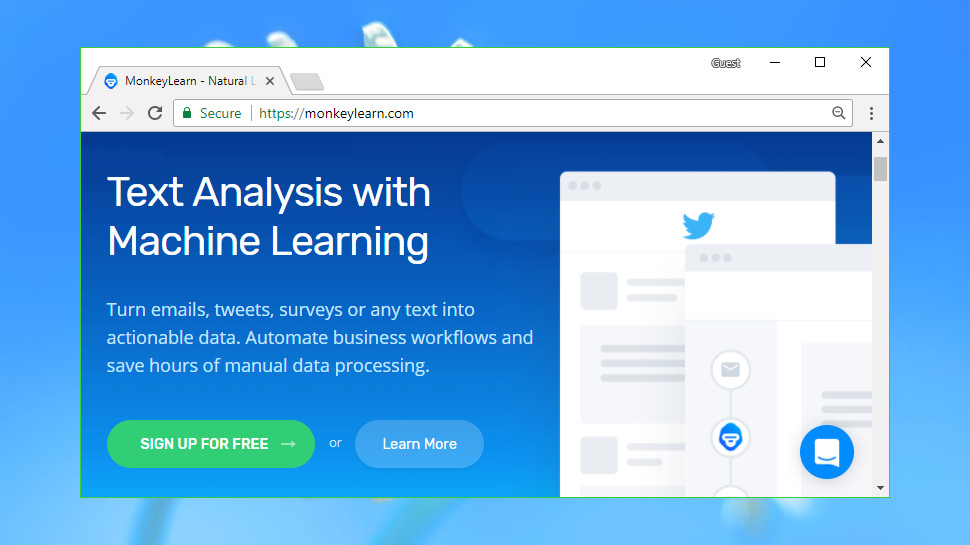What is AI? Watch our explanation above, brought to you by Honor
Getting started with AI can be simple. Decide on the functions you need, locate a service with the features to match, and sign up. Easy.
This approach reduces any technical demands and keeps setup hassles to a minimum, but it won't work for everyone. Choosing a standard tool means it's unlikely to do absolutely everything you require, and it won't be optimized to suit your business.
If your business has some technical resources, it might be better to use an AI platform to build a custom service of your own. This isn't for the faint-hearted, but you won't necessarily need an expensive team of developers, either. Many platforms allow you to start work without any coding at all, and if you've some web development experience – knowledge of JavaScript, for instance – you'll be able to go even further.
Even if you don't ultimately end up using the platform, technical users may find it useful to explore what's on offer. Even top providers like Amazon, Microsoft and IBM allow you to build and test basic tools for free, and the experience will help you understand what you should expect and demand from other AI services.

1. Amazon Machine Learning
Amazon Web Services (AWS) has been delivering powerful cloud-based services to businesses for more than 10 years. It's best known for products like Amazon's Simple Storage Service, but now offers much, much more, including some of the most versatile machine learning tools around.
Amazon Comprehend is a natural language processing service which can analyze documents, social media posts or other text sources to extract their meaning and relationships. You could use this to identify what customers believe are the best or worst points about your products, for instance. Or the service could help you organize content, perhaps grouping news items by subject, or recommending new content to customers based on articles they're read before.
Amazon Translate is a fast and accurate neural machine translation service, used by Hotels.com to (amongst other things) translate some of the 25 million customer reviews the company receives every day.
Amazon Lex helps you extend your applications with Amazon Alexa-level conversational interfaces using voice and text. Bonus language services now include smart translation and natural-sounding text-to-speech. And there's a whole separate group of image and video analysis products which support object and facial recognition, person tracking, facial analysis, text extraction and more.
These are all very professional services and aimed at developers rather than the total novice, but they're not difficult to use, and there are no bulky subscriptions to pay. As ever with AWS, you can sample most services for free, and after that you pay only for what you use. To scan and categorise 240MB of research documents with Amazon Comprehend, for instance, would cost you a one-off fee of $1.56 (£1.25), and that would then allow you to recommend individual documents to users based on their area of interest.

2. Diagflow
Diagflow – the Google-owned service formerly known as API.AI – is a versatile service for extending your applications with intelligent voice and text-based conversational interfaces.
A chatbot? Well, yes, but the term doesn't seem adequate to describe everything Diagflow can do. This isn't just a one-trick bot which works with Facebook alone, for instance. You can also integrate it with Twitter, Skype, Telegram, Kik, Cisco Spark, Google Assistant, Slack and more.
The core ideas remain the same, wherever Diagflow is running. You provide examples of the kinds of requests you want the bot to handle, define the important information (dates, products, prices or whatever they might be) and how the necessary information will be retrieved. The bot provides the intelligence to cope with variations in the phrasing of a request, and to understand its context, so keeping the conversation on track.
Although the bulk of the bot logic is designed in Diagflow's GUI, you'll need some web development experience to retrieve requested data from other websites and services ("what's the traffic like now?", "what's the weather going to be like tomorrow?", and so on).
If you're not intimidated by the technicalities, though, the good news is that Diagflow's Standard Edition is entirely free. There are some usage limits, but nothing that is likely to bother most small businesses – a maximum of 3 text queries per second or 15,000 text requests per month – and overall, it's a great way to learn more about the technology.

3. Microsoft Azure Learning Studio
Microsoft Azure's Machine Learning Studio services support building enterprise-level AI applications which can sense, process and learn from 'big data', finding patterns and meaning that human viewers may miss.
Possible applications range from detecting fraudulent credit card applications, to predicting customer churn, forecasting demand or optimizing prices. Microsoft's Solution Gallery has many other interesting examples of what the technology can do.
This is a very high-end platform, and you'll need a lot of technical expertise and plenty of customer (and other) data to get the most from the service.
But within that context, Microsoft has done a great job of making its product easy-to-use. There's no complex server setup required, and no immediate need for any coding. You can develop your first ideas in a drag-and-drop designer, and deploy simple models as web services within minutes.

4. MonkeyLearn
MonkeyLearn is a versatile platform for analyzing almost any kind of text data, producing actionable insights, and automating many key business processes via its integrations with hundreds of popular applications.
The service can work with tweets, emails, chats, web pages, reviews, documents or whatever other text sources you might find interesting. You're then able to extract different types of data from the text (addresses, emails, company names, keywords), classify that data in some way (decide if an opinion is positive or negative) and carry out some task with the results.
MonkeyLearn works with the Zapier service to connect with more than 750 apps, including Gmail, Google Sheets, Google Calendar, Evernote, Office 365, Twitter, Facebook, Zendesk, WordPress, Pocket, SurveyMonkey, and many, many more (the full directory is here.)
It's these integrations that give MonkeyLearn its real power. The service could analyze Promoter.io or other web feedback and send structured data to Google Sheets, for instance. You might build a notification bot which monitors key websites in your industry for news on competitors. What about processing new Evernote notes and intelligently adding appropriate tags, or classifying RSS posts and producing an analysis and report in Excel?
MonkeyLearn's commercial plans start at $299 (£240) per month, which gets you up to 100,000 queries. But a free plan gives you the basic features and up to 500 queries per month, enough to get a feel for how the service works and whether it's right for you.

5. IBM Watson
IBM Watson is a sophisticated AI platform for developing a wide range of smart business-oriented tools.
There are modules to process almost any kind of data to extract its meaning, analyze and classify content, find answers and look for patterns that you might otherwise miss.
Personality insights and tone analysis help you extract personality characteristics from text, as well as understanding emotions and intent ("how positive or negative is this review?").
Watson isn't restricted to plain text sources. It can convert audio or voice input to plain text, as well as identifying and extracting the visual content found in an image.
Practical benefits of Watson's abilities include tools to create intelligent chatbots and virtual customer service agents, no coding required.
As with Amazon AWS and Microsoft Azure, Watson is designed for professional and technical users. There's plenty of documentation, though, and you're able to try most of the services for free, making it an interesting way to learn more about what AI can do for your business.
- TechRadar's AI Week is brought to you in association with Honor.
source http://www.techradar.com/news/5-of-the-best-ai-platforms-for-business
No comments:
Post a Comment